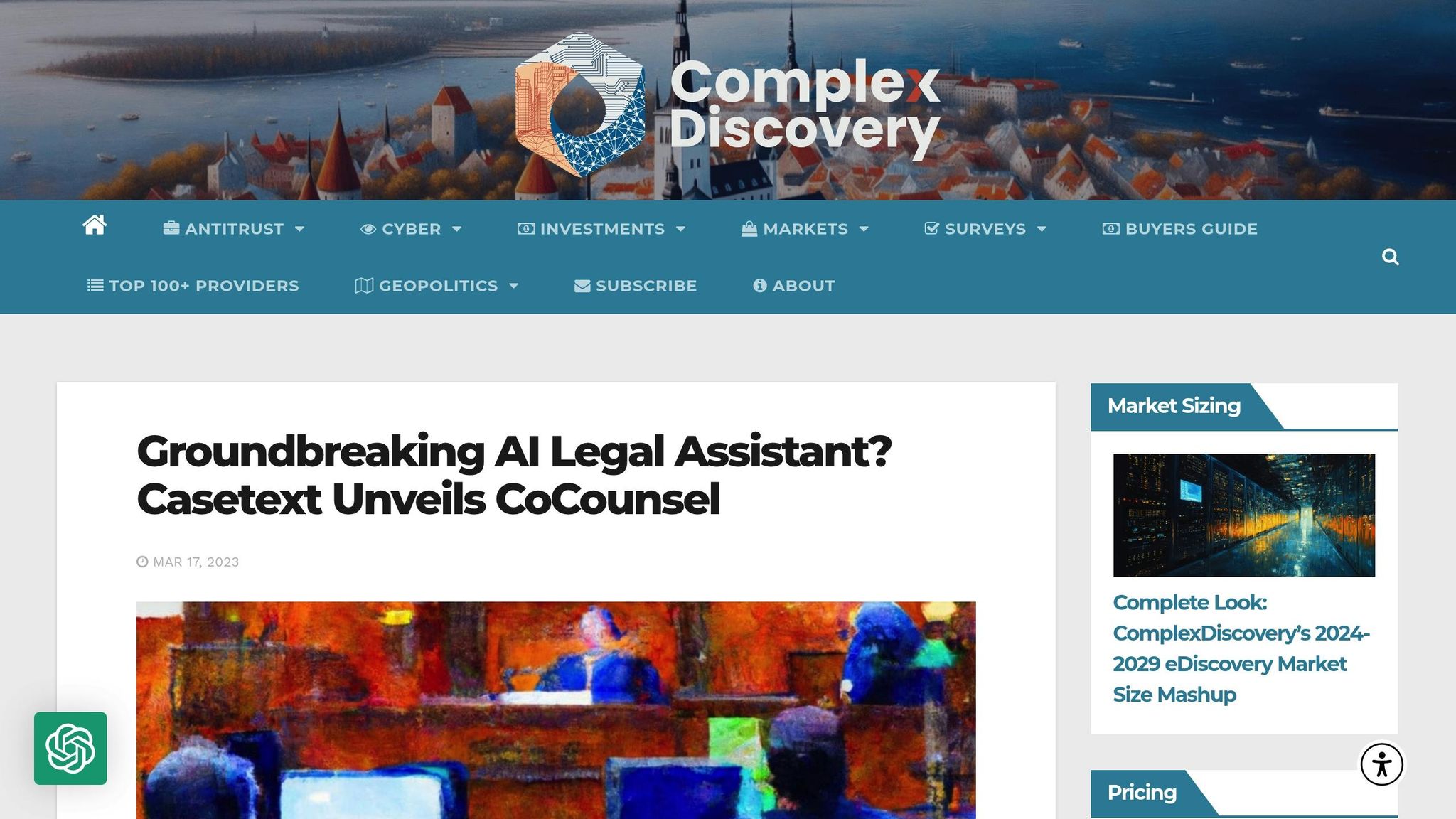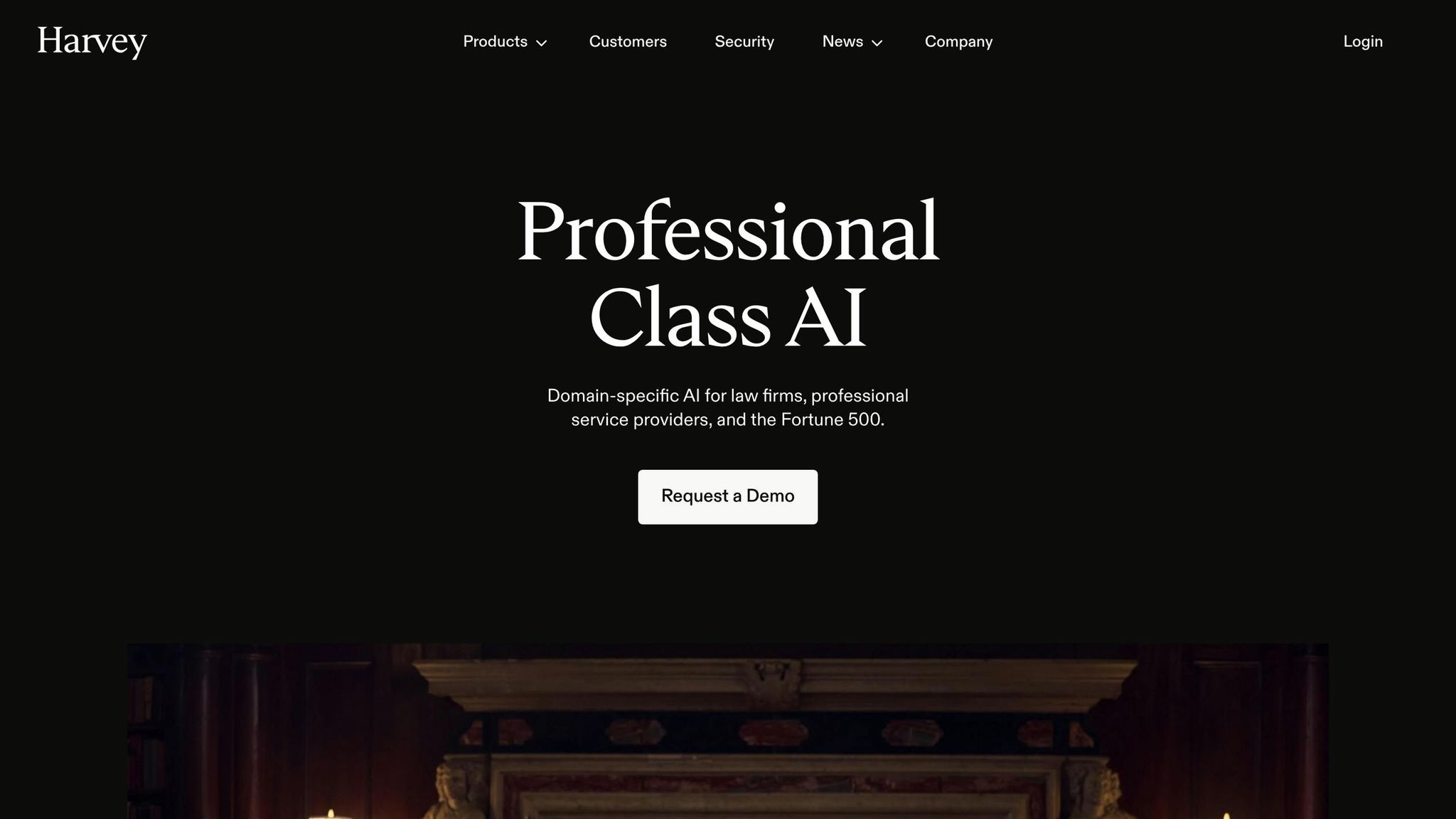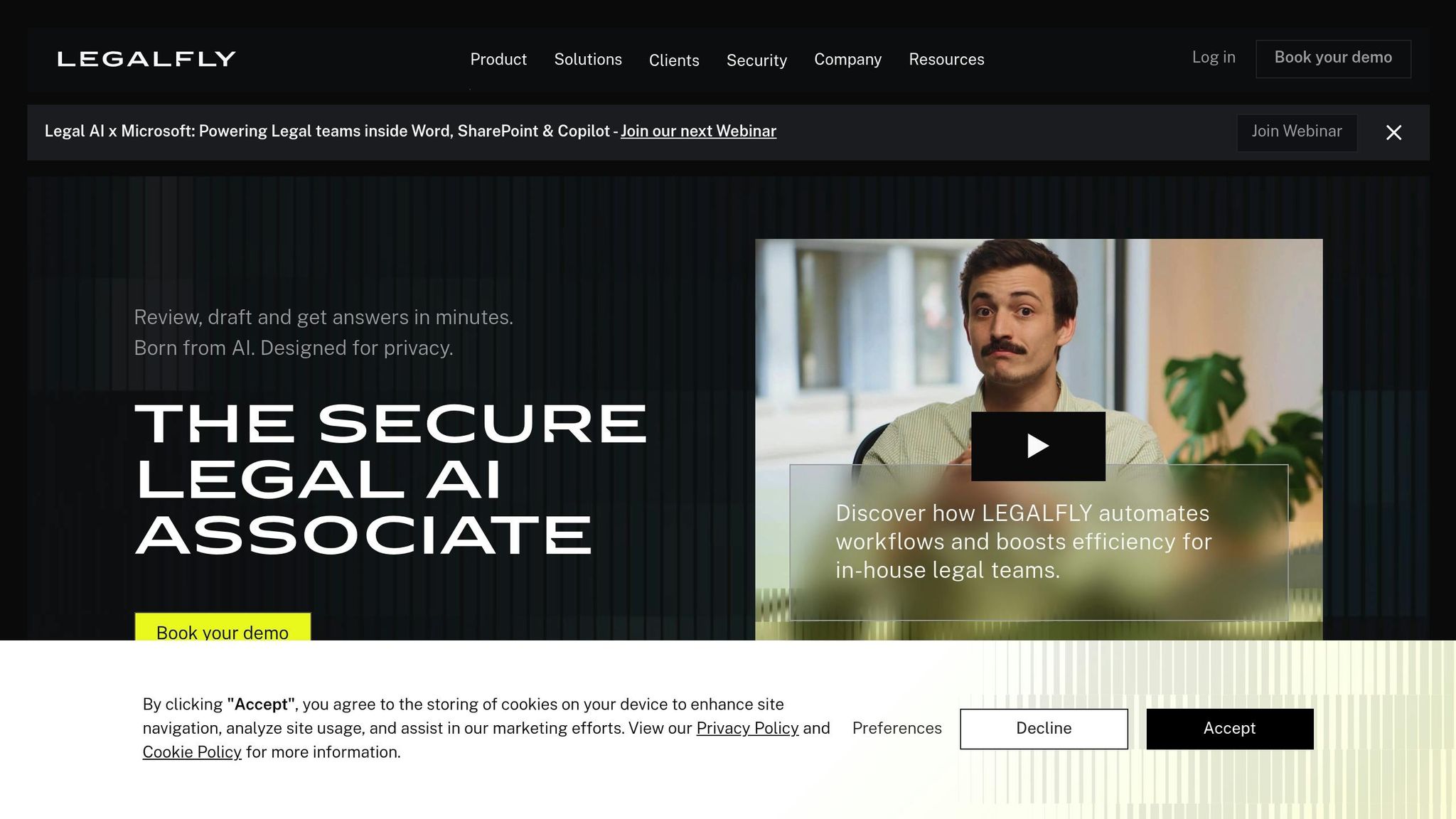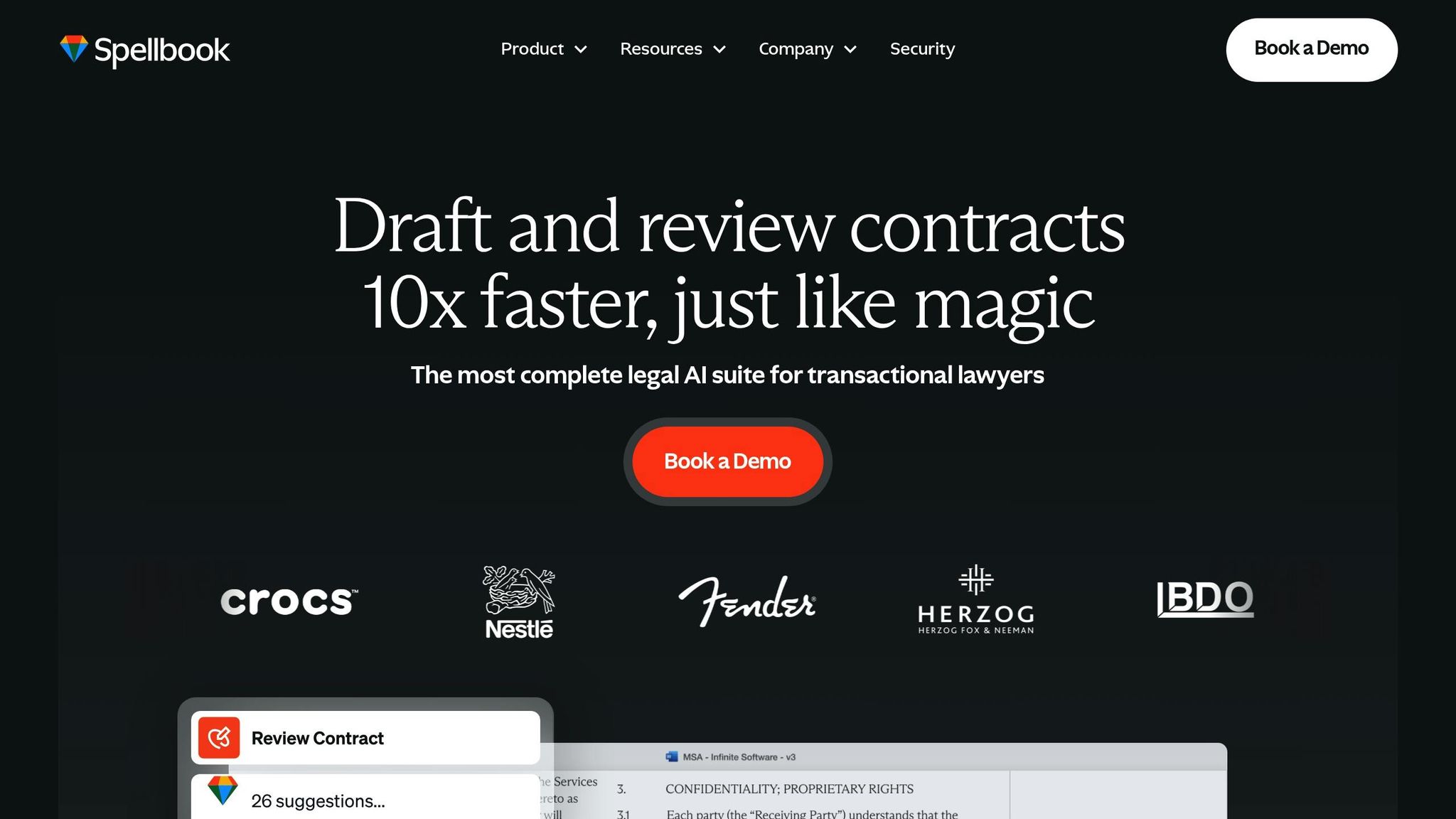Artificial intelligence is transforming the legal industry, with 79% of legal practices now using AI tools in 2025, up from just 19% in 2023. These tools streamline tasks like legal research, document drafting, and contract management, saving significant time and improving efficiency. Here's a quick overview of the top legal AI tools:
- Harvey AI: Focuses on document drafting, legal research, and compliance with strong security measures like SOC2 II and GDPR compliance.
- LEGALFLY: Speeds up contract review and document drafting, reducing time spent by up to 48%, with features like on-premise anonymization and Microsoft Word integration.
- Spellbook: Designed for transactional lawyers, it automates contract drafting, redlining, and legal text generation, integrating directly with Microsoft Word.
Quick Comparison
| Tool | Focus Area | Key Features | Integration | Security Certifications |
|---|---|---|---|---|
| Harvey AI | Legal research, compliance | Multi-layered security, AI agents | Works with legal workflows | SOC2 II, GDPR, ISO 27001 |
| LEGALFLY | Contract review, drafting | Multi-document review, Word add-in | Microsoft Word integration | ISO 27001, SOC 2 Type II |
| Spellbook | Contract management | Redlining, legal text generation | Microsoft Word integration | SOC 2 Type II, GDPR, CCPA |
These tools help legal professionals save time, improve accuracy, and maintain compliance. Choose based on your specific needs, from contract drafting to legal research.
Top 4 AI Legal Tools Revolutionizing 2025 | The Future of ...
1. CoCounsel

CoCounsel, initially created for legal research, has been discontinued, with users redirected to a more established platform.
This change highlights the shifting legal tech industry and the importance of focusing on reliable performance and long-term support.
Check out the following sections for platforms that cater to today's legal professionals.
2. Harvey AI

Harvey AI provides a legal solution powered by advanced AI technology and strong security measures, offering dependable support for legal professionals.
Primary Focus
Harvey AI specializes in drafting legal documents, conducting research, and analyzing documents. Its AI agents, developed with input from legal experts, are designed to deliver precise results.
Security Infrastructure
Harvey AI uses a multi-layered security approach, including robust authentication, network monitoring, and strict protocols. It adheres to industry standards and offers enterprise-level safeguards:
| Security Feature | Details |
|---|---|
| Compliance Standards | SOC2 II, CCPA, ISO 27001, GDPR |
| Enterprise Features | SAML SSO, Audit Logs, IP Address Allow-listing |
| Data Management | Strict Data Residency, Lifecycle Management |
| External Validation | Independent assessments by NCC Group and BishopFox |
Geographic Flexibility
To address regional data protection requirements, Harvey AI operates separate instances for the US and EU. This setup ensures compliance while enhancing its ability to assist with legal needs.
Integration Capabilities
The platform works smoothly with existing legal workflows, supporting multiple document formats and legal software tools. This compatibility allows legal teams to maintain their current processes while improving productivity with AI-driven assistance.
Expert Oversight
A dedicated Security Advisory Board, composed of finance and cloud specialists, continuously works to improve the platform's security and privacy measures.
3. LEGALFLY

LEGALFLY simplifies in-house legal processes, significantly reducing time spent on tasks. Users report a 48% reduction in drafting time and contract reviews that are 2.5× faster.
Core Features
LEGALFLY focuses on essential legal tasks such as:
- Contract review and analysis
- Automated document drafting
- Support for legal discovery
- Document anonymization
"For reviewing document sets, LEGALFLY's multi-document review feature saves me at least 50% of the time compared to manually reviewing the documents one-by-one." – Dieter Vanelverdinghe, Senior Associate, De Groote De Man
Technology Framework
LEGALFLY uses a flexible, LLM-agnostic approach, choosing the best models for each legal task. This allows it to handle various document types like contracts, NDAs, lease agreements, compliance forms, and policy drafts. Its technical setup also ensures strong data protection.
Data Protection
LEGALFLY prioritizes the security of sensitive legal data through measures like:
- ISO 27001 certification
- SOC 2 Type II certification
- On-premise anonymization before processing
- Secure on-premises deployment options
These safeguards make it easy to integrate LEGALFLY into existing legal workflows.
Seamless Integration
LEGALFLY fits into current workflows through tools like its Microsoft Word add-in, helping businesses like Agristo N.V. improve efficiency.
"LEGALFLY has become essential to our workflow, enabling quick reviews of agreements and efficient identification of legal and business risks." – Olivier Van Raemdonck, Managing Partner, Cresco
Users report saving over an hour per discovery query, showcasing LEGALFLY's impact on modern legal operations.
sbb-itb-212c9ea
4. Spellbook

Spellbook is designed specifically for transactional lawyers, offering a powerful tool for legal automation. It has analyzed over 10 million contracts across more than 3,000 law firms and legal teams.
Core Features
Spellbook streamlines tasks like contract drafting, reviewing, redlining, generating legal text, and performing benchmark comparisons. These functions help lawyers save time and ensure consistency in their documents.
Powered by Advanced AI
Built on OpenAI's GPT-4 and other advanced language models, Spellbook is tailored for legal contracting. It has been trained on billions of lines of legal text, allowing it to grasp legal terminology, jurisdiction-specific details, and industry norms.
"Spellbook helps me bill an extra hour daily."
– Todd Strang, Partner, KMSC Law LLP
Data Protection
Spellbook prioritizes security with SOC 2 Type II compliance, zero data retention, and alignment with GDPR, CCPA, and PIPEDA regulations.
Seamless Integration
Spellbook works directly within Microsoft Word, making it accessible for firms of all sizes. Its benchmarking features ensure consistent output that aligns with industry expectations.
"I love Spellbook. I use it every day. It saves me at least one hour, sometimes two hours, a day."
– Diego Alvarez-Miranda, Estate Planning Lawyer, CunninghamLegal
The table below shows how Spellbook compares to other leading legal AI tools.
Features Comparison
Here's a breakdown of the main features of three popular legal AI tools:
| Feature | CoCounsel | Harvey AI | Spellbook |
|---|---|---|---|
| Primary Focus | Legal research | Compliance and contract review | Contract drafting & management |
| Pricing | $110–$400/month (annual plan) | Premium pricing structure | Not disclosed |
| Integration | Not specified | Works with existing legal systems | Direct integration with Microsoft Word |
Key Strengths of Each Tool
- CoCounsel: Speeds up legal research, making it a strong choice for firms needing efficient research capabilities.
- Harvey AI: Focuses on compliance and contract review, with built-in integration for legal systems.
- Spellbook: Simplifies contract drafting and management by automating repetitive tasks.
Integration and Ease of Use
- Harvey AI: Works with existing legal systems, making it a good fit for firms with established workflows.
- Spellbook: Directly integrates with Microsoft Word, making it especially useful for transactional legal work.
Pricing Overview
Pricing details differ:
- CoCounsel offers a clear range of $110–$400 per month (billed annually).
- Harvey AI's pricing is premium but not further detailed.
- Spellbook's pricing remains undisclosed.
Security and Compliance
All three platforms prioritize data protection and align with industry standards. However, detailed information about their specific security measures or compliance certifications isn't available.
When deciding, consider your firm's specific needs, budget, and how well the tool fits into your existing workflow. For tailored recommendations, continue to the selection guide.
Selection Guide
Finding the right legal AI tool means choosing one that fits your practice's needs and technical setup. Legal firms have increasingly embraced AI to streamline operations and boost efficiency.
Practice Area Alignment
Match the tool's features to your specific practice focus for the best results:
| Practice Focus | Key Features to Look For |
|---|---|
| Legal Research | Advanced search capabilities |
| Document Review | Pattern recognition, data extraction |
| Contract Management | Automated templates |
| E-Discovery | Data processing and analysis |
| Due Diligence | Thorough scanning capabilities |
Selecting a tool that aligns with your practice area ensures it complements your workflow effectively.
Technical Requirements
Pick a tool that integrates smoothly with your existing systems. Liza Pestillos-Ocat, Senior Vice President of Global Client Success at Opus 2, emphasizes the importance of maintaining client trust:
"Client confidentiality isn't optional, it's foundational. Any AI solution you bring into your firm must uphold your data protection standards without compromise."
Strong integration and reliable technical support are essential for maintaining both security and efficiency.
Security Checklist
Make sure the AI tool includes these critical security features:
- Data isolation: Keeps client data separate by default
- No cross-client sharing: Ensures data is never shared between clients
- Transparent decision-making: Understand how AI reaches its conclusions
- Audit trails: Clear records of AI actions
- No training on client documents: Protects sensitive information
- Access controls: Limits data access to authorized users
These features are non-negotiable for safeguarding client data and ensuring compliance.
Implementation Success Factors
When properly implemented, legal AI tools can cut document drafting and processing times by up to 90%.
What to Consider for Adoption:
- Ease of use
- Training requirements
- Workflow integration
- Scalability
- Support options
Focus on tools that align with your current processes, maintain strict security protocols, and deliver measurable improvements in efficiency.
FAQs
How do AI tools like Harvey AI improve efficiency in legal practices?
AI tools like Harvey AI significantly boost efficiency in legal practices by automating repetitive tasks and streamlining complex processes. For example, they can handle time-consuming activities such as legal research, due diligence, and contract analysis, allowing legal professionals to focus on higher-value work.
These tools also enhance accuracy and reduce human error by analyzing large volumes of data quickly and providing actionable insights. By integrating AI into daily workflows, legal teams can save time, improve productivity, and deliver more precise results for their clients.
What security features should I look for when selecting a legal AI tool for my law firm?
When choosing a legal AI tool, prioritize strong security features to protect sensitive client data. Look for tools that use end-to-end encryption (such as 256-bit encryption) to safeguard information both in transit and at rest. Ensure the platform offers granular access controls, allowing only authorized personnel to access specific data.
Additionally, opt for tools that follow a privacy-first approach, such as not using your documents to train their AI models. This ensures your data remains confidential and protected. Platforms that utilize private cloud infrastructure or similar secure storage methods can further enhance security. Always verify that the tool complies with relevant data protection regulations to ensure your firm’s and clients’ information stays safe.
How can I choose the right legal AI tool for my practice and technical needs?
To choose the best legal AI tool for your practice, start by identifying the specific tasks you need help with, such as legal research, contract analysis, or document automation. Then, evaluate the features and capabilities of each tool to see how well they align with your practice area and technical requirements.
Consider factors like ease of integration with your existing systems, user-friendliness, and whether the tool addresses your unique workflow challenges. Taking the time to assess your needs and compare options will help you select a solution that enhances efficiency and supports your legal work effectively.



